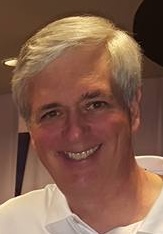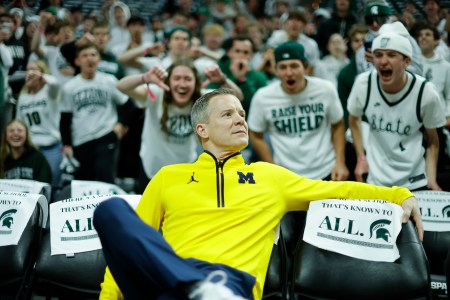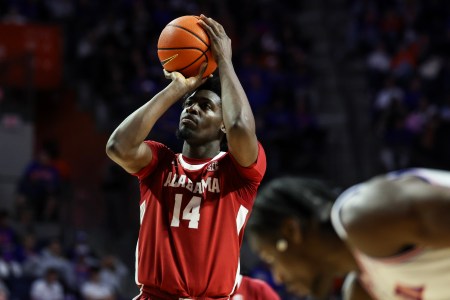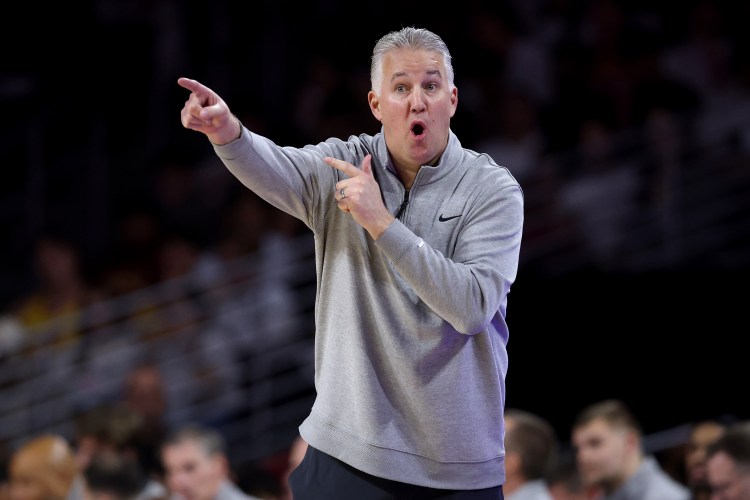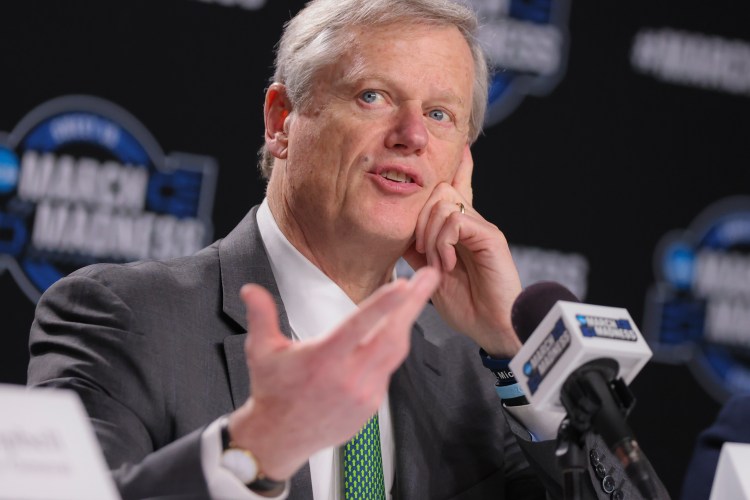ATLANTA — Every college basketball coach in the country has his own take on roster construction, a method of building a team that either works for them, or one year it doesn’t, and they’re looking for a new job and maybe a new philosophy of recruiting, too.
Auburn coach Bruce Pearl’s strategy is simple and will never change. He searches for players who are grateful — just like he is.
“Our guys tend to be more junior college guys, Division II guys, mid-major guys that maybe developed late and come to the high-major level and they’re humble and hungry, and just so grateful,” Pearl told Hoops HQ. “I think the reason I love those kinds of dudes is that I am so grateful. I feel so blessed for the opportunity that I want to coach guys that have a level of gratitude for what they get.”
That comment tracks with Pearl’s coaching history.
He began his head-coaching career in 1992 at then-Division II Southern Indiana, which he guided to the 1995 national championship. From Southern Indiana, he got his first Division I opportunity in 2001 at Milwaukee. After he led the Panthers to the NCAA Tournament’s Sweet 16 in 2005, his big break came — at Tennessee.
Pearl coached the Vols to the NCAA Tournament all six years he was in Knoxville. Then came an minor NCAA rules violation exacerbated by an attempt to cover it up. That cost Pearl his job and the NCAA slapped a three-year show-cause penalty on him.
Pearl wound up at ESPN — the perfect spot for a guy who’s a quote machine and oozes charisma. But in 2014, just as he was becoming the network’s next Dick Vitale, Auburn, its program badly in need of a reboot, reached out to Pearl. Whatever happened at Tennessee didn’t matter. Auburn was only interested in the future.
The move has paid off for the school and for Pearl. The program was in such bad shape that even Pearl, known as a quick fixer-upper, suffered through three consecutive losing seasons. But since then, he’s led the Tigers to six NCAA Tournament appearances, including the 2019 Final Four, signed an eight-year, $50.2 million contract extension in 2022, and has surpassed the legendary Joel Eaves as the winningest coach in school history (242-122 at Auburn].
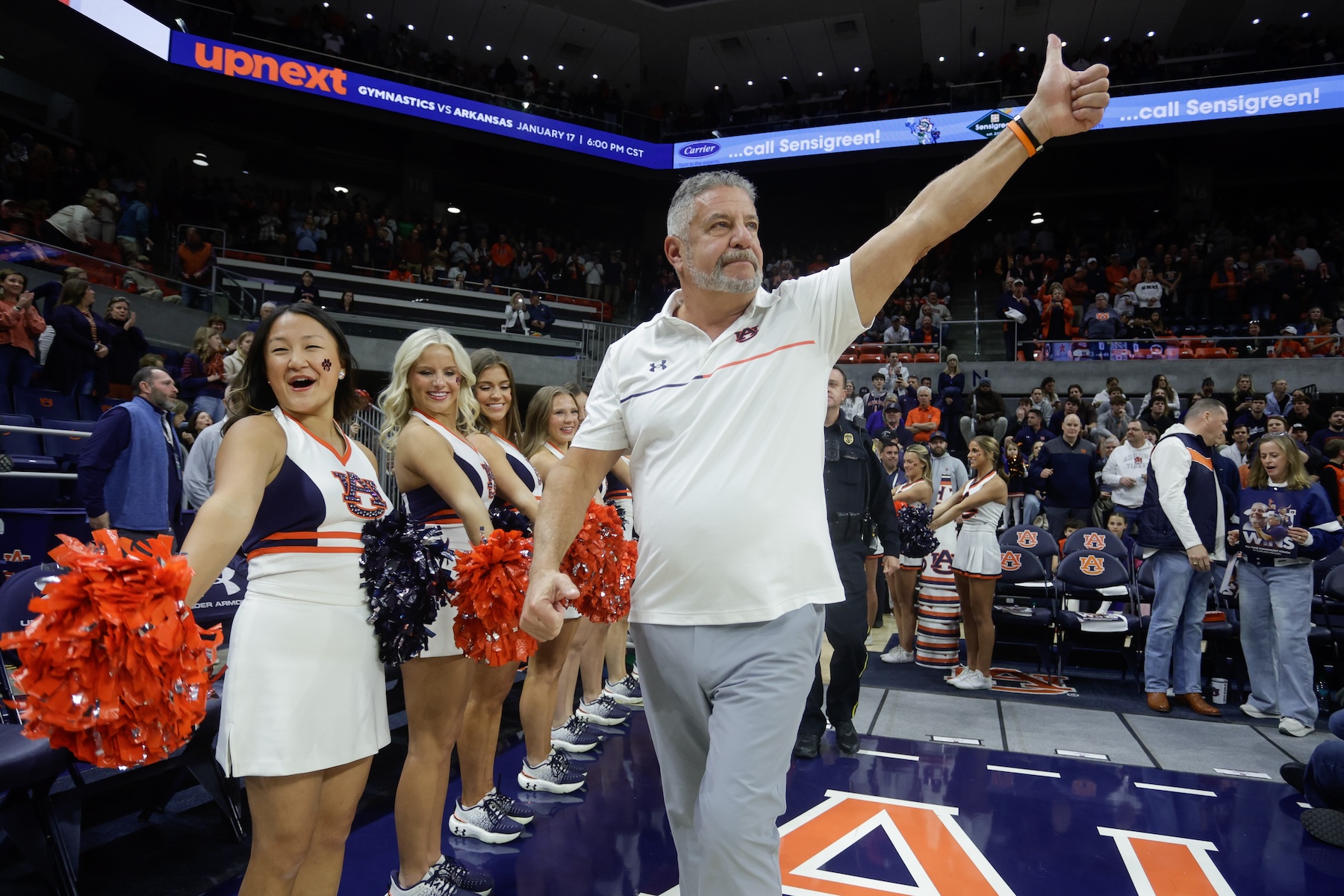
This season, the Tigers were ranked No. 1 in the country and earned the No. 1 overall seed in the NCAAs. They’ll play Michigan on Friday for a spot in the Elite Eight.
So yeah, Pearl is grateful, and that’s why he looks for players seeking a chance like the one Auburn gave him. Pearl and his staff have been so successful finding their kind of players the Tigers have gotten old and stayed old, a formula that tends to build consistent, winning teams.
“I would think that would be a great reflection in the sense that there are guys in this program like Dylan Cardwell, five years, Chris Moore, five years, and Johni Broome, three years,” Pearl says. “Guys that have been in the program and paid their dues. You know — the old-fashioned way.”
Pearl isn’t opposed to taking five-star players, but even they have to have some differentiator attached to them.
“We’ve got one five-star player on our team,” Pearl says. “I’ll take a guy like [freshman guard] Tahaad Pettiford any day. A guy who’s 5-foot-11 and was somewhat overlooked. Or a five-star guy like [6-foot-10 forward] Jabari Smith (2022], who worked his way up to that status because he was a gym rat.”
There was a time not that long ago when the theory was if a team wanted to win a national championship, it had two have two or three guaranteed NBA Draft picks on its roster. That’s not so much the case anymore.
“Bruce Pearl has done an incredible job targeting older, experienced players in the portal and also retaining talent the last couple of years,” says Krysten Peek, who covers the NBA Draft for Hoops HQ. “NBA scouts and executives are intrigued by Broome and especially Pettiford, after the year he’s had, and [6-7 senior Chad] Baker-Mazara has been an excellent addition after dominating the JUCO space.
“It’s no longer a priority for Auburn to win the recruiting battles at the high school level but instead, win in the transfer portal and that’s what has made them successful this season.”
Only one player who began his career at Auburn starts. That’s Dylan Caldwell, who has spent five years in the program, mostly out of the limelight, eager for a chance to do more. After the 2023-24 season, Pearl promised the 6-foot-11, 255-pound graduate if he stayed one more season, he would start alongside Broome. The pairing has been successful.
Of the other fours staters, Broome’s story is the most familiar. All season he’s competed against Duke freshman Cooper Flagg for national player-of-the-year honors. Broome, who played high school basketball in Florida, started his career at Morehead State in Kentucky. He was overlooked by upper-major schools in his home state and some mid-majors, too, but not FAU.

Michigan coach Dusty May shared his Broome recruitment story on Thursday.
“We actually recruited Johni aggressively at FAU [May’s previous coaching stop], and there were four big guys the same year at South Florida, and at that time we couldn’t over sign,” May said. “Giancarlo Rosado committed before Broome. We begged him to wait until the spring, but he wanted to go and get it over with, so he committed to Morehead State. I can’t imagine if he was on our FAU team as well.”
Denver Jones was recruited out of the portal. He was a scorer at FIU. At Auburn, he can still score when he’s called upon, but he’s turned himself into a lockdown defender and has sacrificed some of his individual offensive contributions to play point guard.
Miles Kelly, a 6-foot-5 shooting guard, played three seasons at Georgia Tech. He had a feeling about Auburn when Pearl and his staff were applying their recruiting pitch. He knew his skills, notably three-point shooting, had a place.
“It was the roster,” Kelly says. “That was the biggest thing for me. I knew everything Auburn had coming back. I just felt like I could fit in there and be a great piece for a winning team.”
Baker-Mazzara, a mercurial 6-foot-7 senior, has logged the most frequent flyer miles on this team. He started his college career at Duquesne in 2020. In 2021, he played for San Diego State, where he was chosen Mountain West Conference Sixth Man of the Year. He took a detour to junior college (Northwest Florida State) in 2022 and has spent the last two seasons at Auburn.
Whether he’s knocking down three-pointers or drawing flagrant fouls, Baker-Mazzara is one of Pearl’s guys, glad to be on the big stage where the Tigers now find themselves.
Auburn reached down to Division II to grab 6-foot-7 senior Chaney Johnson from Alabama-Huntsville. He’s fifth on this balanced team in scoring (9.3 points per game), second in rebound (4.9) and is shooting 57.1 percent from the field.
Pearl had high praise for Johnson after he scored 13 points in the Tigers’ first-round NCAA win over Alabama State.
“I think Chaney is like one of those guys that, like, 13 [points] and seven [rebounds for me, is like nothing for Chaney,” Pearl said. “I think he’s a 20, 10 guy. Even though he’s not all the time, I just have that much confidence in him.”
The mix has been potent. Until a late-season slide that saw them lose three of four games, the Tigers had taken on all comers, racking up 16 Quad 1 wins in the regular season, by far the most in the country. You can’t do that without talent.
“Auburn has great talent, including some highly rated players,” ESPN lead analyst Jay Bilas says. “But it’s also balanced with experienced and hungry athletes that are willing to do more in fewer minutes. Bruce has had [Jabari] Smith, [Walker] Kessler, [Aden] Holloway, [Tahaad] Pettiford… he’s not devoid of top-rated talent. He just adds the properly evaluated pieces that weren’t top targets out of high school.”
And once those players get to Auburn, Pearl coaches them up. An expert on that subject is Dane Bradshaw, who Pearl inherited when he took the Tennessee job. At the time, Bradshaw was a 6-foot-4 point guard, a well-rounded player whose only weakness was shooting. Pearl eventually decided the best way to utilize Bradshaw’s talent was to make him an undersized power forward. Bradshaw flourihed and became one of the most popular players in Tennessee history.
“There’s a common theme through Coach Pearl’s career,” Bradshaw says. “And that is people play the best basketball of their lives when they’re under his guidance.”
